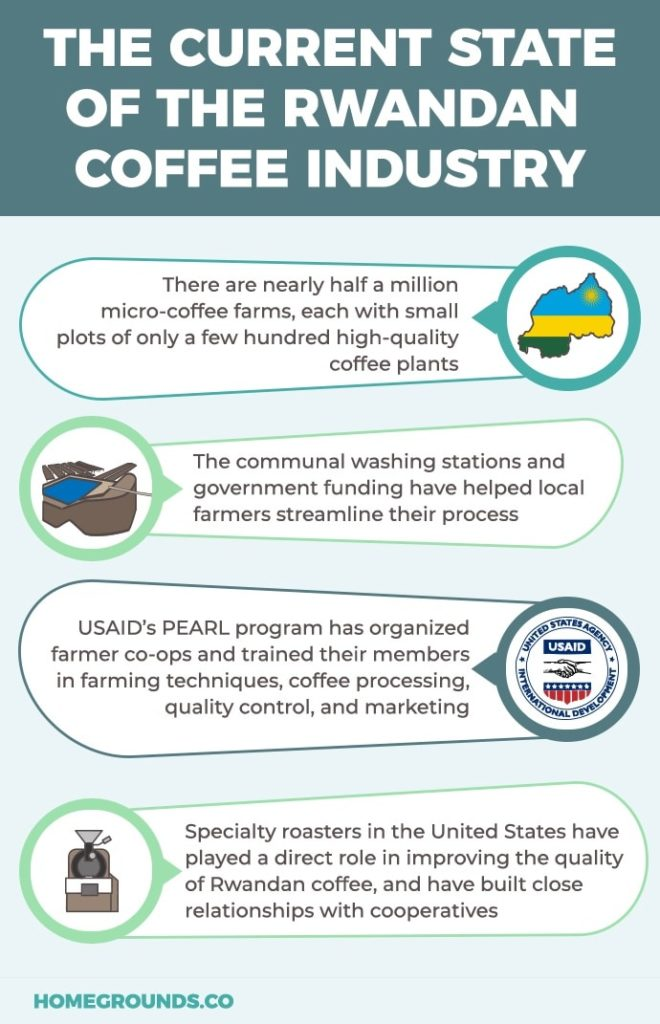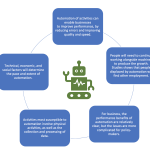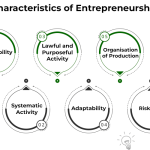The Rwandan coffee industry is experiencing a remarkable transformation, merging economic growth with critical social advancements, particularly in women empowerment. With over 200 cooperatives established since the early 2000s, coffee production has become a key pillar for the female labor force in Rwanda, providing many women with the opportunity to earn wages and escape the vicious cycle of domestic violence. By participating in the processing of coffee cherries, these women not only contribute to the specialty coffee boom but also gain bargaining power within their households. Research indicates that enhanced economic participation leads to a significant reduction in domestic abuse during harvest seasons when women are actively engaged in cooperative operations. As the Rwandan coffee industry flourishes, it is empowering women and reshaping the socio-economic landscape of the nation, highlighting how agricultural initiatives can intertwine with gender equality objectives.
The coffee sector in Rwanda is at the forefront of a social and economic renaissance, proving to be more than just a source of income. This vibrant industry is pivotal in promoting gender equality and reducing instances of domestic violence, particularly through the involvement of women in coffee production. As local cooperatives flourish, they are redefining traditional gender roles, allowing women to earn their own income and assert their rights within the household. This not only boosts their economic standing but also enhances their influence over family decision-making. Ultimately, the evolution of Rwanda’s coffee industry serves as a compelling case study on how agricultural development can drive significant socio-economic changes.
The Impact of Women’s Empowerment on Rwandan Coffee Production
The growth of the Rwandan coffee industry has significantly been influenced by the empowerment of women in the sector. As more women participate in coffee production through cooperatives, they not only contribute to the economy but also gain an avenue for financial independence. By being employed in the mills during the coffee harvest, women are transforming their roles from unpaid family workers to wage earners, which strengthens their economic power and overall status within their households. This shift not only enhances their income but also instills a sense of responsibility and agency in their marital relationships, which is crucial for their empowerment.
Moreover, the presence of Rwandan cooperatives specifically dedicated to coffee processing has provided women with a platform to assert their rights and engage in decision-making within their families. The financial security gained through their wages enables these women to negotiate better terms within their households, directly challenging the traditional norms that may have previously constrained them. As they increasingly take on roles that were once reserved for men, women in Rwanda’s coffee industry are setting a precedent for future generations, proving that female empowerment is a catalyst for both personal and economic growth.
Reducing Domestic Violence Through Economic Empowerment
Research has shown a direct correlation between women’s financial empowerment and a reduction in domestic violence incidents. In Rwanda, studies indicate that female labor force participation in the coffee industry has led to notable decreases in reported domestic abuse cases. When women earn their own income through employment at coffee mills, they gain the ability to assert themselves within their relationships, fostering an environment where they have a greater say in household decisions. This financial autonomy acts as a buffer against domestic violence, particularly during the economically significant coffee harvest season.
The findings from the studies also highlight that as women increasingly participate in the labor market, particularly within cooperative settings, they experience a decline in domestic violence rates. The economic dependency of husbands on their wives’ earnings during busy harvest times means that any form of abuse could jeopardize their financial stability. Hence, the interconnectedness of economic interests and marital dynamics becomes evident, showcasing how women’s economic empowerment not only benefits them personally but also contributes to healthier family relationships.
The Role of Rwandan Cooperatives in Supporting Female Workers
Rwandan cooperatives have been vital in providing women with employment opportunities that enhance their role in the coffee production cycle. These cooperatives are structured to create an inclusive environment where women can thrive as workers and as decision-makers. By processing coffee cherries and participating in the export of high-quality coffee, women enjoy both direct economic benefits and the social empowerment that comes with collective organization. This participation allows them to develop skills and confidence, further solidifying their roles in both their families and communities.
Additionally, cooperatives often establish training programs tailored to women, imparting skills that enhance their employability and productivity. This training not only benefits the cooperatives but also empowers women with knowledge that enables them to make informed decisions about their health, finances, and family planning. The synergy between cooperative engagement and women’s empowerment fosters a sustainable model of growth within the agro-industry, showcasing how Rwandan cooperatives are leading the way in transforming traditional gender roles.
Enhancing the Female Labor Force in Rwanda’s Coffee Sector
The enhancement of the female labor force in Rwanda’s coffee sector is key to the industry’s success and sustainability. Women have historically played a critical role in coffee-related tasks such as harvesting, processing, and sorting. However, their contributions were often undervalued and went unrecognized. With the evolving landscape of the coffee market and the rise of cooperatives, women are now gaining visibility and appreciation for their crucial roles. This recognition not only motivates women to remain active in coffee production but also attracts more women to engage in this lucrative sector.
Furthermore, as the coffee industry expands, there’s a growing need for inclusive policies that promote the participation of women. Gender-specific training initiatives and support systems within cooperatives ensure that women can develop their skills and manage their careers effectively. The inclusion of women in decision-making bodies within these cooperatives also ensures that their needs and perspectives are addressed, promoting gender equality as well as improving productivity and profitability within the sector.
Connecting Economic Empowerment and Social Change in Rwanda
Economic empowerment of women is more than just an income boost; it fosters broader social change in Rwanda. The income women earn from coffee production enables them to invest in their children’s education, enhancing the future prospects of the next generation. As women gain economic stability, their role shifts within both the household and the community, leading to a decrease in domestic violence and an increase in health and educational outcomes. This ripple effect demonstrates the significant impact that women’s financial independence has on societal transformation.
Moreover, women who are economically empowered often become advocates for change within their communities. They participate in discussions regarding policies affecting their lives and can challenge harmful social norms that perpetuate gender inequities. This shift towards women’s leadership and advocacy contributes to long-term societal changes, thus highlighting how economic empowerment can directly influence social dynamics and improve community resilience.
The Effect of Women’s Income on Household Dynamics
The relationship between women’s income and household dynamics is critical in understanding the social fabric of Rwandan society. When women earn their own wages through participation in coffee production, they often experience greater autonomy in household decisions, from budgeting to child-rearing. This shift not only empowers women but also promotes more equitable partnerships within marriages. As men recognize the financial contributions of their partners, they may also adapt their behaviors, leading to a more respectful and collaborative environment at home.
However, this alteration in household dynamics presents challenges as well. While women’s contributions may be recognized, deeply entrenched gender norms can resist this change, leading to tension or conflict regarding roles and responsibilities. It is essential for communities and policymakers to recognize these shifts and support initiatives that promote equitable relationships and challenge traditional norms to create sustainable progress.
Coffee Production as a Catalyst for Gender Equality
Rwanda’s coffee production has emerged as a powerful catalyst for gender equality, offering women economic opportunities that were previously inaccessible. By engaging in coffee farming and processing, women are gaining not just wages but also a platform to challenge gender stereotypes. Their involvement in the coffee industry contributes to a broader movement towards gender equity, as it demonstrates that women can succeed in roles traditionally dominated by men, thereby inspiring future generations to pursue their aspirations regardless of gender.
Furthermore, as the coffee industry thrives, it can serve as a model for integrating gender equity into agricultural practices worldwide. Initiatives that empower women through targeted training, mentorship, and access to resources will undoubtedly lead to more equitable societies. The achievements of women in Rwandan coffee production can inspire similar movements in other regions, setting a precedent for how economic opportunities can drive gender equality on a global scale.
Leveraging Rwandan Specialty Coffee for Economic Growth
The rise of Rwandan specialty coffee has positioned the country as an emerging player in the global coffee market, with the potential for substantial economic growth. By capitalizing on the unique flavors and quality of Rwandan coffee, cooperatives are not only increasing their profits but also attracting international attention. This flourishing market has led to enhanced income for those working within the coffee production sphere, especially women, who are now able to reap the benefits of their hard work and dedication.
With foreign investments and partnerships, there exists an opportunity for Rwandan coffee producers to further expand their market reach and enhance the livelihoods of local women. The focus on specialty coffee can open doors for more inclusivity, allowing women to take leading roles within the production and marketing processes. As these women gain visibility in the industry, they not only improve their financial circumstances but also lay a stronger foundation for gender equality in the workforce.
Policies for Supporting Women’s Roles in Coffee Production
Effective policies are crucial for ensuring that women continue to play an essential role in Rwanda’s coffee production. By developing frameworks that promote gender equality and support women’s integration into the labor market, policymakers can bolster the impact of the coffee industry on empowerment and economic development. Initiatives such as training programs, financial literacy workshops, and legal support for women can equip them with the tools necessary to thrive in a historically male-dominated sector.
Furthermore, advocating for women-friendly policies within cooperatives can help dismantle gender barriers and encourage more women to enter the coffee industry. By providing access to resources and equitable opportunities, these policies can yield significant benefits not only for individual women but also for the collective growth of Rwanda’s coffee sector. As women become increasingly involved in decision-making processes and leadership roles, the potential for transformative change within both the coffee industry and broader society is immense.
Frequently Asked Questions
How does the Rwanda coffee industry empower women and contribute to gender equality?
The Rwanda coffee industry empowers women by increasing their participation in coffee production through cooperatives. By providing women with wage labor opportunities in coffee processing, women gain financial independence and contribute to household income, which significantly improves their bargaining power in families and communities, fostering gender equality.
What role do Rwandan cooperatives play in enhancing women’s participation in the coffee production industry?
Rwandan cooperatives are instrumental in enhancing women’s participation in the coffee production industry by creating structured environments where women can work as paid laborers. This shift from unpaid family labor to paid employment not only boosts their income but also allows them to engage in decision-making processes, thereby empowering them economically and socially.
In what ways does the coffee production sector help reduce domestic violence in Rwanda?
Research indicates that women employed in coffee production in Rwanda experience lower rates of domestic violence. Specifically, as women earn wages through coffee processing, their economic independence reduces dependency on their husbands, which mitigates the risk of abuse. This dynamic is particularly pronounced during harvest seasons when men’s incomes depend on women’s labor.
What findings have emerged from studies on women’s labor in the Rwandan coffee industry?
Studies have shown that women’s labor in the Rwandan coffee industry correlates with a decrease in domestic violence incidents. For example, women engaged in coffee processing at cooperatives reported a 29% reduction in self-reported domestic violence incidents, particularly during busy harvest seasons when their contributions are essential to household income.
How does coffee production in Rwanda contribute to women’s empowerment beyond economic factors?
Beyond economic factors, coffee production in Rwanda contributes to women’s empowerment by increasing their involvement in household decision-making and independent financial management. As women take on paid roles in coffee processing, they gain the confidence and autonomy to participate more actively in family decisions, which fosters greater equality within households.
What impacts do cooperative mills have on women’s livelihoods in the Rwandan coffee industry?
Cooperative mills in the Rwandan coffee industry significantly impact women’s livelihoods by transitioning them from unpaid family roles to wage earners. This shift not only increases their financial resources but also provides opportunities for women to influence household decisions and enhance their social status within their communities.
How can female labor in Rwanda’s coffee industry influence policies regarding women’s rights?
The insights gained from the positive impact of female labor in Rwanda’s coffee industry can influence policies regarding women’s rights by highlighting the importance of economic empowerment for reducing domestic violence and promoting gender equality. Policymakers can use this evidence to advocate for more support and funding for women-centric initiatives in agriculture and beyond.
What challenges do women face in the Rwandan coffee industry despite the progress made?
Despite progress in the Rwandan coffee industry, women still face challenges such as traditional gender roles, limited access to leadership positions within cooperatives, and societal norms that may restrict their economic and personal autonomy. Continued efforts are needed to address these barriers and ensure sustainable empowerment for women.
How has the growth of the Rwandan coffee industry impacted the female labor force?
The growth of the Rwandan coffee industry has positively impacted the female labor force by increasing demand for women in seasonal roles, particularly in coffee harvesting and processing. This trend has allowed more women to enter the workforce, gain financial independence, and improve their social status, thereby empowering them in their communities.
What evidence exists to support the correlation between women’s employment in coffee production and reduced domestic violence in Rwanda?
Evidence supporting the correlation between women’s employment in coffee production and reduced domestic violence in Rwanda includes a study that found a significant decrease in domestic violence incidents among women employed in cooperative mills. The data indicated that the economic independence gained from paid labor altered familial dynamics, which contributed to lower rates of abuse.
| Key Points |
|---|
| Rwanda’s coffee industry is booming, with an increase in cooperative mills since the 21st century. |
| Women participate as seasonal workers in coffee processing, leading to more empowerment. |
| Research indicates that wage-earning women experience a decrease in domestic violence during the harvest season. |
| Higher earnings correlate to increased bargaining power within marriages and better decision-making. |
| The study compares trends in domestic violence between regions with different agricultural practices. |
| Economic interests of men affect domestic violence dynamics during the harvest season. |
Summary
The Rwanda coffee industry plays a crucial role in empowering women and reducing domestic abuse. Through cooperative mills, women gain financial independence and a voice in household decision-making. This empowerment not only benefits their families economically but also plays a significant role in decreasing domestic violence incidents. As the coffee industry continues to grow, it holds the potential for fostering social change and improving gender equality in Rwanda.








